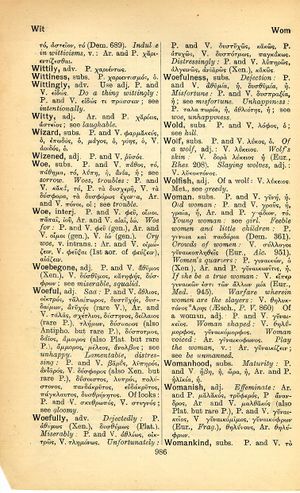womanish: Difference between revisions
From LSJ
ὑπὸ δὲ τῆς φιλαυτίας παρηγμένοι ἄλογα φασὶν τὰ ζῷα ἐφεξῆς τὰ ἄλλα σύμπαντα → it is self-love which leads them to say that all the other animals without exception are non-rational
(Woodhouse 5) |
(CSV5) |
||
| Line 1: | Line 1: | ||
{{ | {{Woodhouse1 | ||
| | |Text=[[File:woodhouse_986.jpg|thumb|link={{filepath:woodhouse_986.jpg}}]]'''adj.''' | ||
<b class="b2">Effeminate</b>: Ar. and P. [[μαλακός]], [[τρυφερός]], P. [[ἄνανδρος]], Ar. and V. [[μαλθακός]] (also Plat. but rare P.), P. and V. [[γυναικεῖος]], <b class="b2">V</b> [[γυναικόμιμος]], [[γυναικόφρων]] (Eur., <b class="b2">Frag.</b>), θηλύνους, Ar. [[θηλύφρων]]. | |||
}} | }} | ||
Revision as of 10:09, 21 July 2017
English > Greek (Woodhouse)
adj.
Effeminate: Ar. and P. μαλακός, τρυφερός, P. ἄνανδρος, Ar. and V. μαλθακός (also Plat. but rare P.), P. and V. γυναικεῖος, V γυναικόμιμος, γυναικόφρων (Eur., Frag.), θηλύνους, Ar. θηλύφρων.

